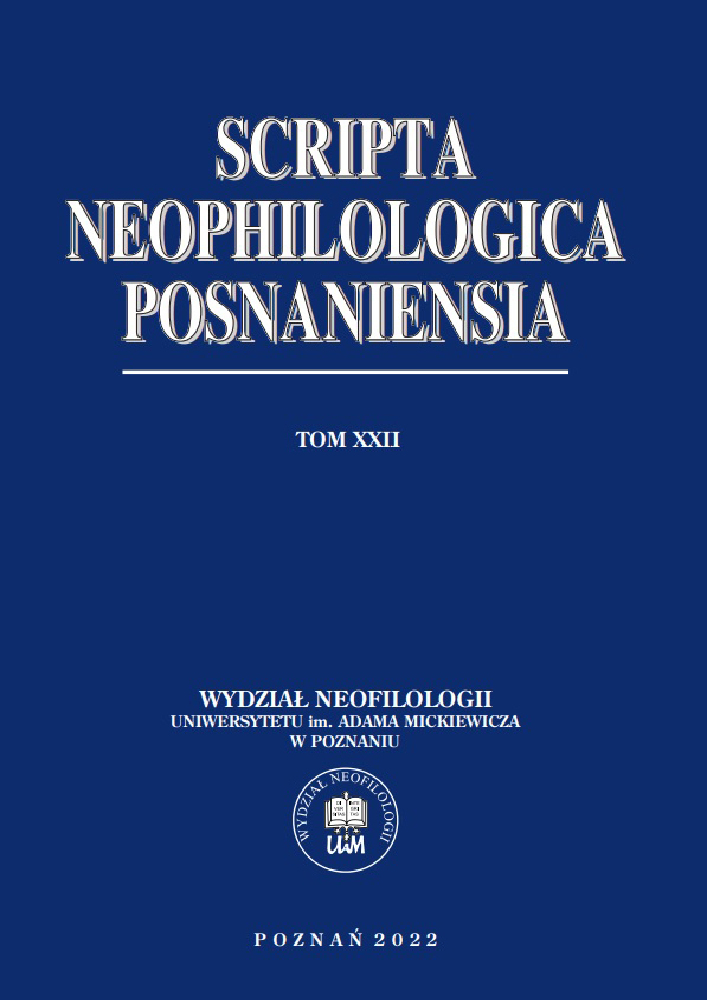Abstrakt
The article is a pragmalinguistic analysis of the inaugural addresses delivered by U.S. presidents from 1981 to 2021. The study was conducted using Voyant Tools, a computer software used in corpus linguistics. Four aspects/parameters of the text that affect its level of complexity and thus the level of assimilation of the message (reading ease) were examined. The analysis included (1) lexical density; (2) average sentence length; (3) readability indices including: Gunning Fog, Flesch-Kincaid and SMOG Index; and (4) a tag cloud (cirrus). The point of reference is the classical Ciceronian concept of the Ideal Speaker, which assumes that the political communicator is both erudite, and linguistically competent, encompassing Latin terms sapientia (the personification of widsdom) and eloquentia (the art of oratory). It boils down to an assumption that a fully competent political actor knows the rules of making speeches so as to reach both elites (Latin: optimates) and ordinary citizens (Latin populares). Using a pragmalinguistic approach, it was questioned whether the presidential addresses analyzed provide evidence that the communicators delivering them meet the criteria, fitting into the role of the ideal orator.
Bibliografia
Aristotle. 1916. Aristotle’s politics. London: Oxfrod Univeristy Press.
Beard, A. 2000. The Language of politics. New York: Routledge.
Campbell, K. and K. Jamieson. 2008. Presidents creating presidency: deeds done in words. Chicago: University of Chicago Press.
Campbell, K.K. and K.H. Jamieson. 1985. “Inaugurating the presidency”. Presidential Studies Quarterly 15.2. 394-411.
Chudinov, A.P. 2008. Politicheskaya lingvistika [Political linguistics]. Moscow: Flinta.
Cicero, M.T. 2001. On the Ideal Orator. Translated by May, J. M. and Wisse, J. London: Oxford University Press. https://doi.org/10.1093/oseo/instance.00148502 DOI: https://doi.org/10.1093/oseo/instance.00148502
Coe, K. and R. Neumann. 2011. “The major addresses of modern presidents: Parameters of a data set”. Presidential Studies Quarterly 41.4. 727-751. https://doi.org/10.1111/j.1741-5705.2011.03912.x DOI: https://doi.org/10.1111/j.1741-5705.2011.03912.x
Connolly, J. 2007. The state of speech: Rhetoric and political thought in Ancient Rome. Princeton, NJ: Princeton University Press.
DuBay, W.H. 2007. Smart language readers, readability, and the grading of text. Costa Mesa, CL: Impact Information.
Fairclough, N., Mulderrig, J. and R. Wodak. 2011. “Critical Discourse Analysis”. In: T. A. van Dijk, (ed.). Discourse studies: A Multidisciplinary Introduction. London: Sage Publication. 357–378. https://doi.org/10.4135/9781446289068.n17 DOI: https://doi.org/10.4135/9781446289068.n17
Flesch, R. 1948. “A new readability yardstick”. Journal of Applied Psychology 32.3. 221–233. https://doi.org/10.1037/h0057532 DOI: https://doi.org/10.1037/h0057532
Garifullina, D.B., Khismatullina, L.G., Giniyatullina, A.Y., Garaeva, M.R. and A.A. Gimadeeva. 2021. “Inaugural speech as a tool of forming speech portrait of the president”. Linguistics and Culture Review 5.S1. 413-421. https://doi.org/10.37028/lingcure.v5nS1.1429 DOI: https://doi.org/10.21744/lingcure.v5nS1.1429
Gee, J.P. 2011. An introduction to discourse analysis: Theory and method (3rd ed.). New York: Routledge.
Halliday, M.A.K. 1985. Spoken and written language. Waurn Ponds, Vic: Deakin University.
Hendrikse, R. and H. Van Zweel. 2010. “A phylogenetic and cognitive perspective on linguistic complexity”. Southern African Linguistics and Applied Language Studies 28.4. 409-422. https://doi.org/10.2989/16073614.2010.548017 DOI: https://doi.org/10.2989/16073614.2010.548017
Inabinet, B. 2011.“The stoicism of the ideal orator: Cicero’s Hellenistic ideal”. Advances in the History of Rhetoric 14.1. 14–32. https://doi.org/10.1080/15362426.2011.559400 DOI: https://doi.org/10.1080/15362426.2011.559400
Ipek, I. 2011. “The effects of text density levels and the cognitive style of field dependence on learning from a CBI tutorial”. The Turkish Online Journal of Educational Technology 10.1. 167-182.
Johansson, V. 2008. “Lexical diversity and lexical density in speech and writing: a developmental perspective”. Lund University Department of Lingusitics Working Papers 53. 61-79.
Klimkiewicz, A. (ed.). Perswazja językowa w różnych dyskursach 7. Gdańsk: Wydawnictwo Uniwersytetu Gdańskiego.
Krawczak, M., Wróbel, A. and M. Laskowski. 2022. “Parezja w starożytnym i współczesnym dyskursie politycznym” [Parrhesia in ancient and modern political discourse]. In: Klimkiewicz, A. (ed.). Perswazja językowa w różnych dyskursach 7. 77-84.
Lenkiewicz, T. 2015. “Homo politicus jako podmiot życia kulturowo-cywilizacyjnego”. Studia Gdańskie. Wizje i rzeczywistość XII. 287-294.
Mohammadi, V., Abdi, R. and H. Eisazadeh, H. 2020. “Inaugural Addresses of American Presidents: A CDA-oriented Analysis of Party Affiliation”. Applied Research on English Language 9.4. 539-560.
Morrison, G.R., Ross, S.M. and J.K. O’Dell. 1988. “Text density level as a design variable in instructional displays”. Educational Communications Technology Journal 36.1. 103-115. https://doi.org/10.1007/BF02766618 DOI: https://doi.org/10.1007/BF02766618
Morreale, S.P., Spitzberg, B.H. and J.K Barge. 2017. Human communication: motivation, knowledge, and skills. (Second Edition). Belmont: Thomson Wadsworth.
Negrine, R., Holtz-Bacha, Ch. and S. Papathanassopoulos. (eds). 2007. The professionalization of political communication. Chicago: The University of Chicago Press.
Olbromski, C.J. 2010. “Homo figurativus versus homo politicus – rozważania na temat kryzysu polityczności”. Środkowoeuropejskie Studia Polityczne 4. 5-24. https://doi.org/10.14746/ssp.2010.4.01 DOI: https://doi.org/10.14746/ssp.2010.4.01
Oliver, S. 2007. "Lexical density in oral versus written Rangi texts". SOAS Working Papers in Linguistics 15. 173-184.
Papathanassopoulos, S., Negrine, R., Mancini, P. and Ch. Holtz-Bacha. 2007. “Political communication in the era of professionalisation”. In: Negrine, R., Holtz-Bacha, Ch. and S. Papathanassopoulos. (eds). The professionalization of political communication. 9-25.
Puppel, S. 2004. “An outline of a domain-resource-agent-access-management (DRAAM) model of human communication: Towards an ecology of human communication”. Oikeios Logos 1. 1-27.
Sheckels, T.F. (ed.). 2012. Political communication in the Anglophone world: case studies. New York: Lexington Books.
To, V., Fan, S. and D. Thomas. 2013. “Lexical density and readability: a case study of English textbooks”. Internet Journal of Language, Culture and Society 37. 61-71.
Tolochko, P. and H.G. Boomgaarden. 2018. “Analysis of linguistic complexity in professional and citizen media”. Journalism Studies 19.12. 1786-1803. https://doi.org/10.1080/1461670X.2017.1305285 DOI: https://doi.org/10.1080/1461670X.2017.1305285
Tuszyńska, K. 2021. „Uwagi na temat inaugural speech Joe Bidena jako aktu retorycznego w świetle klasycznej teorii retoryki”. Scripta Neophilologica Posnaniensia XXI. 335-356. https://doi.org/10.14746/snp.2021.21.15 DOI: https://doi.org/10.14746/snp.2021.21.15
Ure, J. 1971. “Lexical density and register differentiation”. In: Perren, G. and J.L.M. Trim (eds). Applications of Linguistics. London: Cambridge University Press. 443-452.
Whitney, G. 2009. “Anticipating Obama”. Ask Gleaves. Paper 10. Source: http://scholarworks.gvsu.edu/ask_gleaves/10. [DOA: 30.10.2022].
Licencja

Utwór dostępny jest na licencji Creative Commons Uznanie autorstwa – Bez utworów zależnych 4.0 Międzynarodowe.

